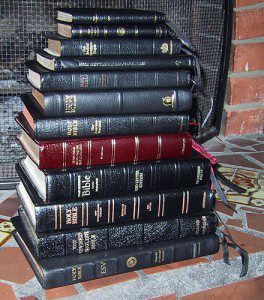So many different translations of the Bible are available. Which are the best? Does it really matter which version of the Bible we read?
The King James Version (KJV)
The best selling book of all time is the Bible. No book has ever come close to selling as many copies compared to the Holy Bible. The King James Version is the best selling version of all the Bible translations and is the most widely read in the United States. It has been time tested and much beloved by those who still prefer it, first published in 1611. In 1604 King James VI commanded that the Bible be translated into English in response to a perceived problem by the Puritans who were considered a faction at that time. The King James Version is often called the “Authorized” King James Bible because of it’s authorization by the King himself.
I use my old King James Version frequently because mine has the original Hebrew and Greek words in the margins for some words and sentences. It also has a great number of cross references for almost every verse in it. It is hard to use for some because of the “King’s English” but others prefer it as an elegantly written language that is poetic in nature. What I like about the King James Version that I have is that some words are in italics. The words in italics were added by the translators to give the verses more meaning, to help the flow of the text, or as in some cases, to put their own beliefs into the Scriptures. When I read the King James Version, I often leave out the words in italics so that I can see what the original author was intending to say since the words in italics were not in the original manuscripts and are not inspired by the Holy Spirit.
 The New King James Version (NKJV)
The New King James Version (NKJV)
Here is another Bible version that is very popular in the world. It is much like the King James Version except that “thee and thou” are translated to the modern use of the English language like “you” (singular) and “your’s” (plural). It is essentially the same as the Authorized Version but it simply has more modern language. Another example is when the King James Version uses “verily, verily” the New King James uses “most assuredly” (John 5:24a). Besides a few minor differences, the New King James Version is still very close to the Authorized Version and is still highly popular in the States as well as in many parts of the world.
The New King James Study Bible that I have is helpful because, like most Study Bibles, they give some historical background to the verses which help me understand the context much better. It’s as important knowing what is being written as much as why it is being written and to which audience it is being written too.
The English Standard Version (ESV)
I have two English Standard Version Bibles. They are both study Bibles. One is the Reformation Study Bible from Ligonier Ministries and the other is John MacArthur’s Study Bible. The study notes are excellent supplemental materials when using them for topological subjects or for expositional preaching. There is a danger with these, as with any study Bibles. The readers should be aware that the notes are not inspired by God. They might be written by men inspired by the Holy Spirit but they are technically not “God-breathed” as the Scriptures themselves are. The reader therefore can not take study Bible notes on an equal footing with the Scriptures. They must be seen as only an addition to what the author or scholars see how the verses apply to the Christian and they come from their own unique perspective. Even the Reformation Study Bible and the MacArthur Study Bible do not agree on ever issue. One example is the rapture. Both of these authors, scholars, and theologians do not hold to the same view.











